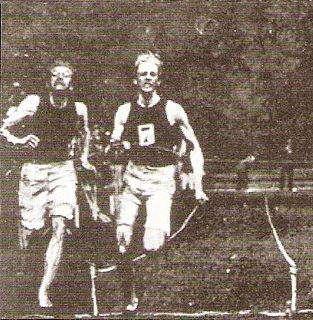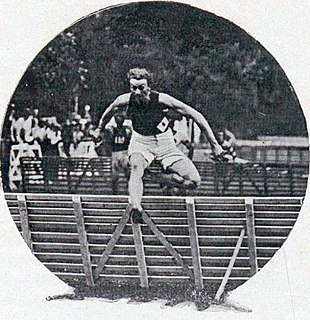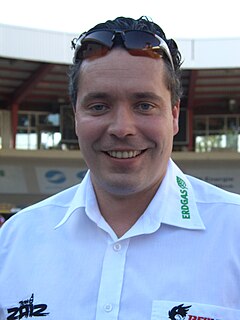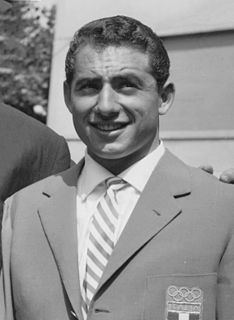Frank Washington Jarvis was an American athlete, and the Olympic 100 m champion of 1900.
At the 1900 Summer Olympics, twenty-three athletics events were contested. Altogether, 117 athletes from 15 nations competed. A total of 68 medals were awarded. In many countries, due in part to the conflation of the Olympic Games and the World's Fair in Paris, the media discussed only the athletics events under the "Olympic" name while ignoring the incredible variety of other sports featured at the time.
The men's 100 metres was the shortest of the sprint races at the 1908 Summer Olympics in London. The competition was held over the course of three days. The first round was held on 20 July, the semifinals on 21 July, and the final on 22 July. NOCs could enter up to 12 athletes, The event was won by Reggie Walker of South Africa, the first time the gold medal went to a nation other than the United States. The Americans did stay on the podium with James Rector's silver medal. Canada won its first medal in the event, a bronze by Robert Kerr.
The men's 400 metres was an Olympic event for the fourth time at the 1908 Summer Olympics in London. The competition was held from July 21, 1908, to July 23, 1908. The rerun of the final was held on July 25, 1908. The races were held on a track of 536.45 metres=1⁄3 mile in circumference.
The men's 800 metres made its fourth Olympic appearance at the 1908 Summer Olympics. The competition was held on July 20, 1908, and on July 21, 1908. The races were held on a track of 536.45 metres=1⁄3 mile in circumference. It was run in two rounds, with the winners of the eight heats of the first round competing in the final.

The men's 60 metres was the shortest of the track races at the 1900 Summer Olympics in Paris, which was the first time the event was held. It was held on 15 July 1900. 10 athletes from 6 nations competed. Five preliminary heats were scheduled, though only two were actually held. The top two athletes from each of the heats advanced to the final, resulting in a final race that featured three United States runners and an Australian. Hurdle specialist Alvin Kraenzlein of the United States won the event, with his countryman Walter Tewksbury in second and Australian Stan Rowley earning bronze.

The men's 200 metres was a sprinting event on the athletics programme at the 1900 Summer Olympics in Paris. It was held on July 22, 1900, well after most of the rest of the athletics events. The 1900 Games were the first time the 200 metres was contested. The races were held on a track of 500 metres in circumference. Eight athletes from seven nations competed. The event was won by Walter Tewksbury of the United States. Norman Pritchard of India took silver while Australian Stan Rowley earned bronze.

The men's 400 metres was a track & field athletics event at the 1900 Summer Olympics in Paris. It was held on July 14, and July 15, 1900. The races were held on a track of 500 metres in circumference. 15 athletes from six nations competed.

The men's 110 metres hurdles was the first of the track and field events on the athletics programme at the 1900 Summer Olympics in Paris. It was held on July 14, 1900. Nine athletes from three nations competed in the shortest of the hurdling events. The event was won by Alvin Kraenzlein of the United States, the second of five consecutive victories for the nation in the first five Olympic Games. It was also the first of four consecutive podium sweeps for the Americans in the event.

The men's 200 metres hurdles was a hurdling event on the athletics programme at the 1900 Summer Olympics in Paris. It was held on July 16, 1900. 11 athletes from five nations competed in the middle of the three hurdling events. The event was won by Alvin Kraenzlein of the United States, earning his fourth individual gold in athletics in one Games—a record that still stands as of the 2016 Games. The silver medal went to Norman Pritchard of India, while another American earned bronze.

The men's 400 metres hurdles was a track & field athletics event at the 1900 Summer Olympics in Paris. This event was held for the first time at the Olympics. The competition took part on July 14 and July 15, 1900. The race was held on a track of 500 metres in circumference. Five athletes from four nations competed in the longest of the three hurdling events. The event was won by Walter Tewksbury of the United States. Henri Tauzin of France earned silver, while George Orton of Canada took bronze.
Stanley Rupert Rowley was an Australian sprinter who won four medals at the 1900 Summer Olympics. He was born in Young, New South Wales and died in Manly, New South Wales.

The men's 60 metres was a track and field athletics event held as part of the Athletics at the 1904 Summer Olympics programme. It was the second and last time the event was held at the Olympics. 12 athletes from 3 nations participated. The competition was held on August 29, 1904. The event was won by Archie Hahn of the United States, with William Hogenson second and Clyde Blair third as the host nation swept the medals. It was the first of three gold medals in the sprints won by Hahn in 1904.
The men's 100 metres sprint event at the 1956 Olympic Games in Melbourne, Australia, was held at the Melbourne Cricket Ground on 23 and 24 November. Sixty-five athletes from 31 nations competed; each nation was limited to three athletes. The final was won by American Bobby Morrow, marking the fifth consecutive victory by a different American. Hec Hogan of Australia won that country's first medal in the event since 1900. The competition took place in strong winds, with the final run into a 2.5 m/s (5.6 mph) headwind.
Edmund Joseph "Cotton" Minahan was a professional baseball player, and American track and field athlete who competed at the 1900 Summer Olympics in Paris, France.

The men's sprint at the 1992 Summer Olympics (Cycling) was an event that consisted of cyclists making three laps around the track. Only the time for the last 200 metres of the 750 metres covered was counted as official time. The races were held on Tuesday, July 28, Wednesday, July 29, Thursday, July 30 and Friday, July 31, 1992, at the Velòdrom d'Horta. There were 23 competitors from 23 nations, with each nation limited to one cyclist. The event was won by Jens Fiedler of Germany, the first victory in the men's sprint for Germany as a unified nation since 1936. Gary Neiwand of Australia took silver, the third time that nation had a runner-up in the event; Neiwand was only the fourth man to win multiple medals in the sprint. Canada earned its first medal in the men's sprint with Curt Harnett's bronze.

The men's sprint at the 1996 Summer Olympics (Cycling) was an event that consisted of cyclists making three laps around the track. Only the time for the last 200 metres of the 750 metres covered was counted as official time. The races were held on July 24 through July 28, 1996 at the Stone Mountain Velodrome. There were 24 competitors from 16 nations, with nations once again being allowed to have up to two cyclists each. The event was won by Jens Fiedler of Germany, the second man to successfully defend an Olympic sprint title. Curt Harnett of Canada also repeated as bronze medalist; he and Fiedler were the fifth and sixth men to win multiple medals of any color in the event. Marty Nothstein of the United States took silver, the nation's first medal in the event since 1984.

The men's single sculls competition at the 1956 Summer Olympics took place at Lake Wendouree, Ballarat, Australia. The event was held from 23 to 27 November. There were 12 competitors from 12 nations, with each nation limited to a single boat in the event. The event was won by Vyacheslav Ivanov of the Soviet Union, the nation's second consecutive victory in the men's single sculls. Ivanov was so thrilled when he was presented with his gold medal that he jumped up and down with joy-and dropped the medal into Lake Wendouree. He immediately dived into the lake to retrieve it, but couldn't find it. After the games were over he was given a replacement medal. Stuart Mackenzie took silver, making it the second consecutive Games with an Australian runner-up. American John B. Kelly Jr., after missing the finals in 1948 and 1952 by 0.4 seconds and 0.2 seconds respectively, reached the final and took the bronze medal this time.

The men's sprint at the 1960 Summer Olympics in Rome, Italy was held on 26 to 29 August 1960. There were 30 participants from 18 nations. For the first time since 1924, nations were allowed to have more than one competitor each ; for the first time since 1924, one nation took multiple medals. Italians Sante Gaiardoni and Valentino Gasparella won gold and bronze, giving Italy a four-Games podium streak with three total gold medals—second all-time behind France's five. Leo Sterckx's silver was Belgium's first medal in the men's sprint.
The men's sprint was a cycling event held at the 1968 Summer Olympics in Mexico City, Mexico, held on 18 to 19 October 1968. There were 47 participants from 28 nations. Each nation was limited to two cyclists. The event was won by Daniel Morelon of France, his second consecutive medal and first gold; it was also France's world-leading sixth victory in the men's sprint. His countryman Pierre Trentin, who had lost the bronze medal match to Morelon four years earlier, this year won it against Omar Pkhakadze of the Soviet Union. Between the French cyclists was silver medalist Giordano Turrini of Italy, extending that nation's streak of top-two results in the event to six Games.









